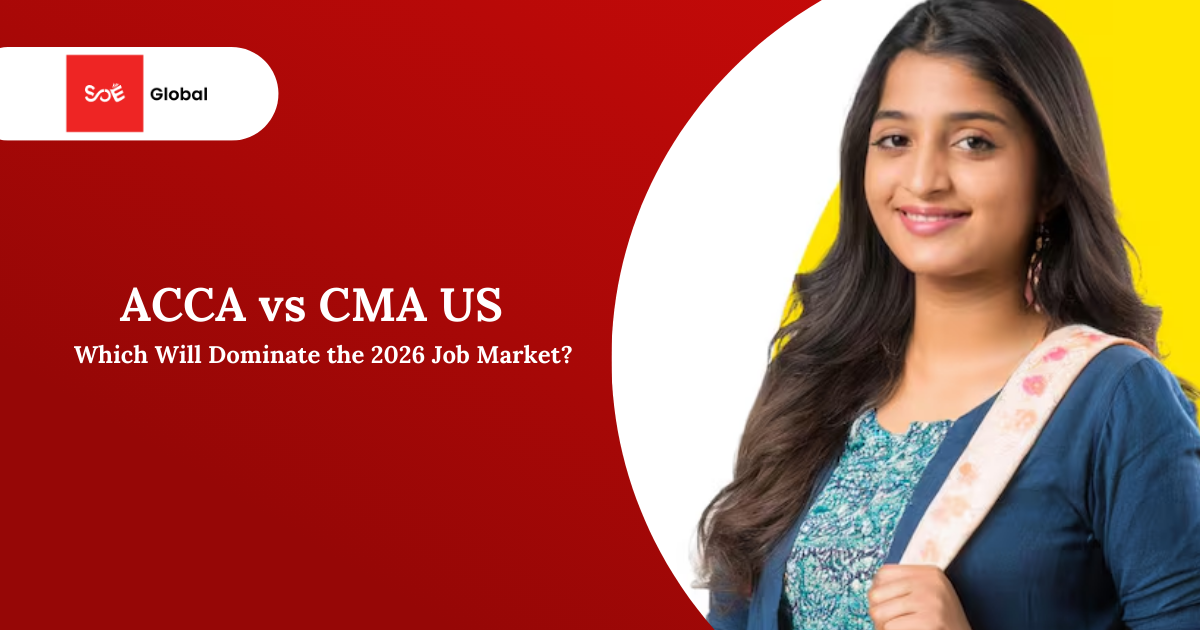Table of Contents
ToggleThousands of working professionals in India successfully pursue CMA USA certification without interrupting their careers. According to the Institute of Management Accountants (IMA), approximately 40% of CMA candidates are employed full-time while studying, demonstrating that balancing professional responsibilities with certification pursuit is entirely achievable.
For ambitious working professionals asking “how to get CMA certification while working full-time,” the answer lies in strategic time management, intelligent study approaches, and leveraging employer support. This comprehensive guide reveals practical pathways working professionals have used to obtain prestigious CMA credentials within 14-20 months whilst maintaining—and often improving—their career trajectory.
As the legendary business strategist Peter Drucker wisely stated, “The greatest leadership challenge is managing the things that must happen.”
Managing CMA certification pursuit alongside full-time employment demands this exact principle. The certification process doesn’t require abandoning your career—it requires intelligent orchestration of priorities, focused effort, and realistic planning. This guide provides that orchestration framework, enabling working professionals to transform their finance careers through strategic certification whilst maintaining current income and professional momentum.
How to Get CMA Certification
The fundamental requirement for working professionals pursuing CMA is not superhuman commitment—it’s strategic time allocation. Research shows working professionals successfully complete CMA certification dedicating 8-12 hours weekly to studies, complemented by quality coaching and focused preparation strategies.
The 90-Minute Morning Study Block Method
Early morning study before work commencement represents the most effective strategy for employed professionals. Waking at 4:30-5:00 AM and studying for 90 minutes (5:00-6:30 AM) provides uninterrupted focus before work demands emerge. This approach offers multiple advantages:
- Peak cognitive performance: Your brain operates at highest capacity early morning
- Consistency: Morning routine remains stable regardless of work intensity
- No work interference: Unexpected meetings or deadlines don’t disrupt study
- Weekly accumulation: 90 minutes × 5 days = 7.5 hours weekly
- Psychological advantage: Studying completed before work creates confidence
Many working professionals report this strategy delivers superior results compared to evening study. You complete challenging concepts when mental clarity peaks, building strong foundational understanding. Evening study, whilst possible, often results in reduced concentration due to work fatigue.
Weekend Intensive Study Sessions
Weekends provide opportunities for longer, focused study blocks. Saturday and Sunday sessions of 2-3 hours each (total 5-6 hours weekly) supplement weekday morning study. Use weekend study for:
- Practicing full-length mock examinations under timed conditions
- Reviewing challenging topics requiring deeper focus
- Working through case studies and scenario problems
- Completing practice question banks systematically
Weekend study complements weekday study effectively—weekday mornings build foundational knowledge; weekends apply concepts through problem-solving.
Lunch Break Utilisation
Working professionals in office environments often overlook lunch break study opportunities. Dedicating your lunch hour (12:00-1:00 PM) to focused study contributes 5 hours weekly. Lunch break study works particularly well for:
- Reviewing previous day’s concepts (reinforcement)
- Working through practice questions
- Reading financial analysis case studies
- Completing light study during mental mid-day dip
The Hybrid Approach: Optimal Balance
Combining morning (90 minutes), lunch break (1 hour), and weekend (4 hours) study creates balanced 12-15 hours weekly—sufficient for 6-10 month exam completion. This hybrid approach:
- Prevents burnout through varied study timing
- Adapts to inevitable work disruptions
- Provides flexibility when unexpected demands emerge
- Maintains consistent weekly progress
Critical Time Management Tips:
- Establish non-negotiable study schedule—treat study time like important business meetings
- Use coaching centre materials designed for working professionals (compress 300+ hours into 200 focused hours)
- Create distraction-free study environment (dedicated desk, phone off)
- Track weekly study hours, adjusting as needed
- Schedule exam dates in advance, communicating with employers
- Take one complete rest day weekly—burnout defeats certification purpose
How Long to Get CMA Certification While Working
Working professionals pursuing CMA should expect realistic timelines based on their specific circumstances:
Part-Time Professional (20-hour/week commitment):
- Weekly study: 5-7 hours
- Part 1 completion: 8-12 months
- Part 2 completion: 8-12 months
- Total certification timeline: 18-24 months
- Work experience: Fulfils parallel to study
Full-Time Professional (40-50 hour/week work):
- Weekly study: 8-12 hours
- Part 1 completion: 6-10 months
- Part 2 completion: 6-10 months
- Total certification timeline: 14-20 months
- Work experience: Accumulates concurrent with studies
High-Intensity Seeker (40 hours work, dedicated focus):
- Weekly study: 15-20 hours
- Part 1 completion: 4-6 months
- Part 2 completion: 4-6 months
- Total certification timeline: 10-14 months
- Work experience: Builds rapidly during certification
Employer Support: Leveraging Organisational Resources
Many employers actively support employee CMA pursuit, recognising the competitive advantage certified finance professionals provide. Understanding available support maximises your certification efficiency:
1. Study Leave Provisions:
Major employers (Big 4 consulting, banks, technology companies, multinational corporations) typically provide 3-5 days paid study leave per exam. This constitutes approximately 15-20 focused study hours critical for final exam preparation. Request study leave 4-6 weeks before exam dates, providing employers advance notice.
2. Exam Fee Reimbursement:
Many organisations reimburse exam fees (₹20,000-30,000 per part) upon passing, recovering approximately 50-100% of direct examination costs. Verify reimbursement policies with your HR department before incurring expenses. Some companies reimburse regardless of pass/fail; others only upon successful completion.
3. Study Material Sponsorship:
Premium employers provide study materials (HOCK International textbooks, online resources, coaching fees) worth ₹30,000-1,00,000. Request study material sponsorship from HR or your manager, explaining career development benefits. Such sponsorship reduces your financial investment substantially.
4. Flexible Work Arrangements:
Progressive employers offer flexible schedules during exam preparation periods—work-from-home options, flexible start/end times, or reduced hours during exam weeks. Discuss these arrangements with management 4-6 weeks before exams, proposing specific flexibility needs.
5. Internal Mentoring:
Large finance departments employ experienced CMAs who mentor colleagues. Leverage this internal mentoring—learning from colleagues’ experiences accelerates your preparation. Informal study groups with CMA-certified colleagues provide invaluable insights and motivation.
Negotiating Employer Support:
Present a clear business case to your employer:
- “CMA certification will enhance my financial analysis capabilities, directly improving [specific job function]”
- “I will complete certification within [realistic timeline] whilst maintaining full job performance”
- “Investing in my certification costs ₹X lakhs but returns ₹3-5 lakhs annually through improved productivity and potentially higher salary premium”
- Provide specific support requests (study leave, fee reimbursement, flexible arrangements)
Most employers recognise CMA certification value and offer reasonable support when presented professionally.
Study Strategy Comparison: Working Professional Approach
| Strategy | Time Commitment | Best For | Advantages | Challenges |
|---|---|---|---|---|
| Morning Study | 90 min daily (7.5 hrs/week) | Early risers | Peak cognitive performance, consistency | Early wake-up required |
| Weekend Intensive | 4-5 hrs both days | Family-oriented professionals | Work-life balance, extended focus | Limited weekday progress |
| Lunch Break | 1 hour daily (5 hrs/week) | Office professionals | Minimal schedule disruption | Limited location flexibility |
| Evening Study | 2 hours daily (10 hrs/week) | Night owls, flexible jobs | Natural study time for some | Work fatigue reduces effectiveness |
| Hybrid Approach | 12-15 hrs/week combined | Most working professionals | Flexibility, burnout prevention, optimal balance | Requires strong discipline |
Balancing Work Performance and CMA Studies
Successfully pursuing CMA certification whilst maintaining work performance requires intentional strategies:
Preventing Work Performance Degradation:
- Schedule exam preparation 2-3 months before exams, not last minute
- Communicate exam schedule to your manager and team
- Deliver critical work projects before heavy study periods
- Use study time outside work hours exclusively
- Maintain professional reliability and deadlines consistently
- Actually, many professionals report improved job performance—financial knowledge gained through CMA study applies directly to work responsibilities
Career Advancement During Certification:
Rather than hindering career progression, CMA certification pursuit often accelerates it:
- Demonstrate commitment and ambition to employers and managers
- Apply learning directly to your current role—improved financial analysis impresses leadership
- Use certification as springboard for internal promotions or better-paying roles
- Some companies offer promotions upon certification completion
- Global mobility increases—CMA credential opens international opportunities
Many working professionals successfully transition to higher roles during or immediately after certification completion.
Comparative Financial Analysis: Working vs. Studying Full-Time
| Scenario | Annual Income | Study Investment | Net Annual Benefit |
|---|---|---|---|
| Keep working, pursue CMA | ₹8-15 lakhs (current) | ₹1.5-2.5 lakhs (14-20 months) | ₹8-15 lakhs maintained + ₹3-5 lakhs premium upon certification |
| Leave job, study full-time | ₹0 (14-20 months gap) | ₹1.5-2.5 lakhs | Income loss: ₹14-30 lakhs over period |
| Part-time work, part-time study | ₹4-8 lakhs (50% role) | ₹1.5-2.5 lakhs | ₹4-8 lakhs maintained + premium upon certification |
The financial case strongly favours working full-time while pursuing CMA—you maintain income, build work experience, and avoid career gaps.
Real Success Stories: Working Professionals Who Achieved CMA
Case 1: Rahul, Financial Analyst, Big 4 Consulting (Mumbai)
- Started: Junior Financial Analyst earning ₹7 lakhs
- Timeline: 16 months to complete CMA while working
- Strategy: Morning study 5-6:30 AM (6 days/week), weekend sessions
- Result: Promoted to Senior Analyst (₹12 lakhs) upon certification; employer reimbursed exam fees
- Learning: “Consistency mattered more than study hours—90 minutes daily beat sporadic 4-hour weekend sessions”
Case 2: Priya, Corporate Finance, Manufacturing Company (Pune)
- Started: Budget Analyst earning ₹5.5 lakhs
- Timeline: 18 months with family responsibilities
- Strategy: Hybrid approach—morning (60 min) + lunch breaks + weekend Sunday session (2 hours)
- Result: Transitioned to Finance Manager (₹14 lakhs); company promoted her upon CMA completion
- Learning: “Employer support was crucial—study leave before exams, material sponsorship, and flexible hours made enormous difference”
Case 3: Arun, IT Professional transitioning to Finance (Bangalore)
- Started: Software Developer, earning ₹10 lakhs (non-finance background)
- Timeline: 20 months (longer due to accounting knowledge gaps)
- Strategy: Evening study 7-9 PM, enrolled in premium coaching (SOE Global)
- Result: Joined Big 4 Finance role (₹11 lakhs), career pivoted to finance
- Learning: “Quality coaching was invaluable—structured approach compensated for non-accounting background; achieved certification despite non-traditional entry”
Conclusion: Your CMA Certification Is Achievable While Working
Successfully obtaining CMA certification whilst working full-time is entirely achievable through strategic planning, dedicated effort, and intelligent resource utilisation. Thousands of working professionals complete certification annually, maintaining and advancing their careers simultaneously. The key requirements are:
- Realistic time commitment: 8-12 hours weekly for 14-20 months
- Strategic study timing: Morning hours, lunch breaks, weekend sessions combined optimally
- Quality coaching: Structured programmes designed for working professionals compress 300+ hours into focused learning
- Employer communication: Negotiate support, leverage available resources
- Consistent discipline: Non-negotiable study schedule maintained regardless of work pressures
- Realistic expectations: Acknowledge this requires effort but remains achievable alongside career
The financial case is compelling—maintain your income (₹8-15 lakhs annually), invest ₹1.5-2.5 lakhs in certification, and emerge earning ₹12-25 lakhs with premium career opportunities. The 18-24 month investment compounds into ₹1+ crore lifetime earnings advantage.
Still uncertain whether you can balance full-time work and CMA certification? Concerned about specific challenges in your situation? Let SOE Global’s expert career counsellors guide your journey. We specialise in coaching working professionals through CMA certification, optimising study schedules, and managing work-study balance effectively.
Enrol for your complimentary career consultation with SOE Global today. We’ll assess your work situation, design a personalised study schedule, outline realistic certification timeline, identify employer support opportunities, and provide ongoing guidance throughout your certification journey.
Visit www.soeglobal.com or contact our Chennai centre at 073580 02200, Coimbatore centre at 88382 07669.
Your CMA certification awaits. Transform your finance career without abandoning current income. Choose strategic action today.
FAQs on How to Get CMA Certification While Working
How to get CMA certification while working full-time?
Dedicate 8-12 hours weekly for studies using morning (5-6:30 AM), lunch breaks, and weekends strategically. Study 6-10 months per exam part. Choose quality coaching (SOE Global) for efficiency. Complete 2-year work experience parallelly. Stay focused, use practice tests, maintain discipline throughout.
How long does it take to get CMA certification working full-time?
Total timeline: 14-20 months typically. Part 1: 6-10 months study. Part 2: 6-10 months study. Work experience: 2 years (fulfils concurrently). High achievers complete within 12-14 months. Timeline depends on study hours weekly and prior accounting knowledge depth.
Can I study for CMA while working full-time?
Absolutely yes. Thousands complete CMA annually whilst working full-time. Requires 8-12 hours weekly study commitment. Morning studies (5-6:30 AM) work best for professionals. Weekend sessions support progress. Many employers offer flexible arrangements during exams. Success depends on discipline and consistency.
What is the best study schedule for working professionals?
Morning sessions (5-6:30 AM): 90 minutes before work. Lunch break: 1 hour study. Weekends: 3-4 hours Saturday and Sunday. This hybrid approach provides 10-12 hours weekly study. Alternatively, evening study (7-9 PM) works if energised. Consistency matters more than timing.
How many hours of study are needed for CMA while working?
Minimum 8-10 hours weekly required. Each exam part needs 150-170 hours total. 6-8 months minimum per part. Working professionals typically take 8-12 months per exam. Study intensity varies with accounting background. Quality beats endless hours—focused study delivers better results.
Should I change jobs to study for CMA certification?
Not necessary unless job demands exceed 50 hours weekly. Most professionals balance full-time work successfully. Choose employers offering study support (flexible hours, leave). If job stress extreme, consider role change, not complete job loss. Part-time work provides additional study time flexibility.
Do employers support CMA certification for working professionals?
Yes, many offer substantial support. Big 4, banks, IT firms provide study leave (3-5 days per exam), fee reimbursement (50-100%), study materials, flexible work arrangements. Discuss with HR before starting. Such support dramatically eases certification for working professionals.
Can I get CMA certification and maintain work performance?
Absolutely. Plan studies outside work hours (morning, weekends). Communicate exam schedule to managers. Most find certification improves job performance through financial knowledge. Use vacation strategically for exam preparation. Balance prevents burnout, maintains career growth trajectory.
What is the cost to get CMA certification while working?
Total investment: ₹1.5-2.5 lakhs (registration ₹15,000-25,000, materials ₹30,000-50,000, coaching ₹60,000-1,00,000, exams ₹40,000-60,000). Many employers reimburse upon passing. Cost spread over 14-20 months minimises financial burden. ROI justified by +58% salary increase.
What preparation strategy works best for working professionals?
Enrol in coaching centre like SOE Global for structured curriculum designed for working professionals. Use HOCK materials—specifically compressed for time-constrained schedules. Complete mock tests regularly under timed conditions. Join study groups with fellow working professionals. Maintain consistent weekly schedule adjusted for work demands.




